Table of Contents
‘Weaponized rage’: Madness in the marketplace of ideas, the college presidents’ controversy continues — First Amendment News 404
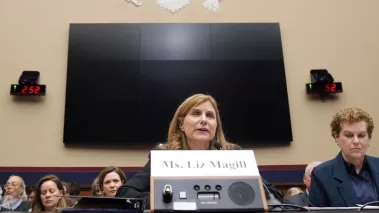
Josh Morgan / USA TODAY
The then-president of the University of Pennsylvania, Liz Magill, testifying before the House Committee on Education & the Workforce on Dec. 5, 2023.
The Enlightenment ideal has left at least three Ivy League campuses in recent weeks, as the clamor over the Israel-Hamas War continues. Rage has conquered reason. Chaos has triumphed over civility. Discord — not discourse — is the coin of the college realm.
The air of self-righteousness and duplicity is everywhere, as censorial practices combine with anti-Semitism to produce a toxic concoction that is antithetical to any notion of meaningful education. It would be comical (witness the recent SNL skit) if it were not so terrible.
That vital societal “interest in the attainment of truth,” as Zechariah Chafee tagged it, and Alexander Meiklejohn’s notion that “the First Amendment is an expression of human goodness,” have become nothing more than romantic mantras — often preached but seldom practiced. When it comes to college campuses and the controversies of the day, John Mill’s faith in the marketplace of ideas and Holmes’ cynical championing of it are wildly at odds with the reality of our times.
Rabbi Jay Michaelson is right to characterize these college conflicts as “weaponized rage.” In that frenzied atmosphere, those on each side demand a pound of flesh. Meanwhile, a contentious congressional hearing makes for good theater by both the interrogators and their “lawyered-up” targeted witnesses.
Whatever one makes of this latest manifestation of the culture wars, a few voices merit our attention. For example, consider Majority Leader Chuck Schumer’s powerful address on anti-Semitism on the Senate floor on Nov. 29:

Then there is Rabbi Jay Michaelson’s sober article in The Forward: “The university presidents were right and American Jews’ moral panic is wrong” with excerpts set out below:
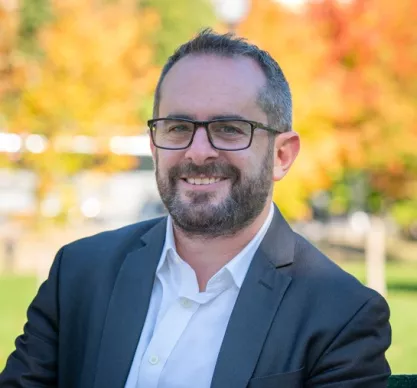
American Jews are in a moral panic about antisemitism, and we need to get hold of ourselves before we do more damage to ourselves and the society we care about. I’m referring, most recently, to the widespread outrage over three university presidents — now one ex-president — who testified recently on Capitol Hill about antisemitism on college campuses. Because the presidents were right.
[W]hile [the college presidents] were correct as a matter of legal policy, they clearly made a gigantic mistake, politically speaking. As legal commentator David Lat pointed out, they failed to “read the room.” Meaning, they provided legally accurate answers but emotionally and politically inept ones. A smarter response would have been “I completely condemn antisemitism, and any call for genocide against anyone. But you are asking about a harassment policy, and for something to qualify as harassment, there has to be a direct threat made to another person. When that is present, it is harassment. When it is not, it is protected speech on a university campus, even if it is antisemitic or racist.”
The only trouble with that response is that the right-wing demagogue Stefanik would never let them make it. Again and again, Stefanik refused to let these out-of-place scholars complete their sentences before yelling her next question. This is someone schooled in the dark arts of Bill O’Reilly and Tucker Carlson, in turn gleaned from Roy Cohn: Never let your target finish. Interrupt, aggressively and often. Knock them off their balance. Set the trap.
Finally, Professor Claire O. Finkelstein makes a realist point when she argued that “[c]ountering speech with more speech might just mean adding to the hateful rhetoric on campus and would not solve the problem.” Finkelstein continued, “And university presidents can set up all the task forces, study groups and educational modules they like, but what kind of educational effort could possibly bring together warring groups that are busy calling for one another’s violent demise?”
A sampling of opposing views
Koppelman: Get universities out of the ‘bullshit business’
- Andrew Koppelman, “Universities must quit with the BS,” The Hill (Dec. 11)
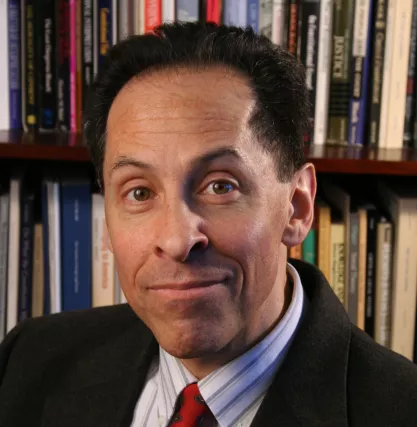
[T]here is . . . reason, why administrators ought to remain silent on [politically partisan matters]: anything they say is almost certainly bullshit, and the mission of the university is antithetical to the production of bullshit.
I here use “bullshit” as a technical term. The philosopher Harry Frankfurt explains in his classic analysis that a bullshitter is uninterested in the truth or falsity of his speech: “the motive guiding and controlling it is unconcerned with how the things about which he speaks truly are.” Rather, he merely wants to elicit a certain reaction: “What he cares about is what people think of him.”
[ . . . ]
Official university statements are necessarily bullshit, because the administration is aiming to produce a result — inducing the public to admire the school, and signifying a certain flavor of social solidarity. The bullshitter, Frankfurt writes, “does not care whether the things he says describe reality correctly. He just picks them out, or makes them up, to suit his purpose.”
[ . . . ]
The demand for blather, we see today, can become intense. There is a market for bullshit. Each faction demands, and sometimes gets, ritual obeisance.
The job of academia is the discovery of truth. Universities should not be in the bullshit business.
Tribe on troubling answers and bullying presidents
- Jeremy W. Peters, Anemona Hartocollis, and Dana Goldstein, “Harvard’s Board Says President Will Stay, Despite Calls for Her Ouster,” The New York Times (Dec. 12)
Some of Dr. Gay’s supporters seemed eager to put the divisive episode behind them. Laurence H. Tribe, a Harvard law professor emeritus, had criticized Dr. Gay’s performance at the congressional hearing as “hesitant, formulaic and bizarrely evasive.” Yet he joined hundreds of other members of the faculty in signing a petition calling for Dr. Gay to keep her job, saying it was dangerous for universities to be bullied into making decisions about whom to hire and fire.
“I do think that building bridges is preferable to exploding them,” Mr. Tribe said on Tuesday, after the board announced its decision to keep Dr. Gay as president.
Trump weighs in support of Stefanik
- “Peter Beinart & Omer Bartov on UPenn President Resignation, Gaza & the Weaponization of Antisemitism,” Democracy Now! (Dec. 11)
Thank you, Elise. What a job she’s done. You know, I watched the way — she’s very smart. I watched the way she was asking the questions, and they were asked in a very complex way. And these women, who I guess are smart, but, boy, that was — they were really dumb answers, weren’t they? But they were asked in a very complex way, and these people had no idea what the hell they were doing. I said, “You know, I think she’s got to lose her job.” I guess they’re all going to be losing their job within the next day or two, but one down, two to go.
Raskin on Trump, Stefanik, and anti-Semitism
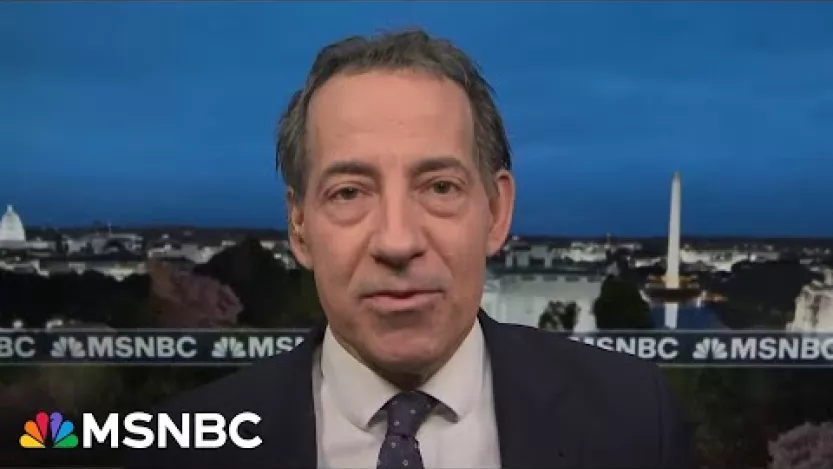
Finkelstein on the need to restrict speech
The following quotes are from Claire O. Finkelstein’s piece in The Washington Post, “To fight antisemitism on campuses, we must restrict speech”:

[T]he value of free speech has been elevated to a near-sacred level on university campuses. As a result, universities have had to tolerate hate speech — even hate speech calling for violence against ethnic or religious minorities. With the dramatic rise in antisemitism, we are discovering that this is a mistake: Antisemitism — and other forms of hate — cannot be fought on university campuses without restricting poisonous speech that targets Jews and other minorities.
Penn . . . does not follow the Second Amendment; if it did, our campus would be a war zone, especially given our apparent embrace of hate speech!
[E]ven public universities that are bound by the First Amendment are not helpless in the face of hate speech. They do not have to stand idly by and wait for such speech to turn into “conduct.” Public institutions can restrict the “time, place and manner” of demonstrations; they can restrict speech that incites violence, that involves threats of violence against specific individuals or that involves the targeted harassment of members of the community.
Tapper: “This has been a real week for anti-Semitism”
- Jake Tapper, “U.S. grapples with a string of bigotry and hateful acts,” CNN (Nov. 11)
Lukianoff: Penn needs a change in leadership . . . but for pro-free speech reasons
- Greg Lukianoff, “FIRE statement: Penn resignations can be exactly what the university needs to restore free expression,” FIRE (Dec. 9)
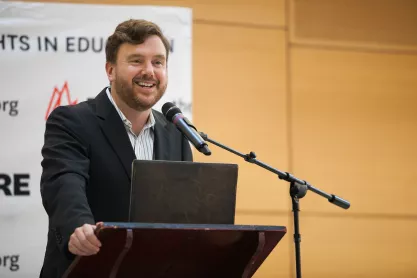
There is serious work to do: Penn finished second to last in our College Free Speech Rankings and has maintained a terrible record in recent years on free speech and academic freedom. Giving administrators who had already been so eager to police speech and had applied such glaring double standards an even freer hand to stifle expression would be the worst possible result.
A change of leadership could be exactly what Penn needs — as long as the new leadership prizes dialogue, ideological non-conformity, a culture of free speech that takes seriously the search for truth, and the process of debate and discussion that will get students there. From day one, every student should learn the value of free inquiry and how to talk constructively across lines of difference.
Related
- Stephen Rohde, “University Presidents Were Right to Condemn Hate Speech and Defend Free Speech,” First Amendment News (Dec. 8)
The three presidents, Elizabeth Magill of the University of Pennsylvania, Claudine Gay of Harvard, and Sally Kornbluth of Massachusetts Institute of Technology, testified before the House Committee on Education and the Workforce at a hearing entitled “Holding Campus Leaders Accountable and Confronting Antisemitism.”
The episode reveals not only how little our elected officials and the American people understand about the concept of protected free speech at our colleges and universities; it shows how, in a free society, confidence in the value of protecting all ideas and viewpoints — even those we despise — is eroding.
- Nico Perrino, “FIRE to Congress, university presidents: Don’t expand censorship. End it,” FIRE (Dec. 6)
[T]he solution to this moral cowardice is not to expand the use of vague and overbroad harassment codes so that they apply in more cases. Rather administrators should eliminate these codes and defend free speech in all cases. No hypocrisy. No double standards.
FIRE webinar: ‘Political Expression and Campus Derecognition’
- Political Expression and Campus Derecognition, Dec. 21, 4 p.m. EST.
Since the events in Israel on October 7, we have seen colleges and even state governments attempt to derecognize or punish student groups for their political expression.
Join FIRE Legal Director Will Creeley, FIRE Senior Fellow Nadine Strossen, and Senior Attorney with the Institute for Justice Paul Sherman to learn more about the history and legality of this trend, as well as how these current attempts at censorship threaten free speech in our society.
Peter Beinart on silencing support for Palestinians
- “Peter Beinart & Omer Bartov on UPenn President Resignation, Gaza & the Weaponization of Antisemitism,” Democracy Now! (Dec. 11)
Mr. Beinart is the editor-at-large of Jewish Currents:
This really isn’t about those individual presidents. It’s about the fact that given the extraordinary slaughter that’s happening in Gaza, there is a movement on college campuses and across America for a ceasefire and to end American complicity in that slaughter. And in response to that, the effort is now to try to limit the ability of people who want to protest U.S. policy and support Palestinian rights from being able to organize on college campuses. So the reason that you’re going after these presidents is to try to set a precedent and bring in people who will be much tougher on restricting the ability of students and faculty and others who want to organize politically against this war in Gaza. This is what this is about.
Bartov: ‘This whole debate was off-kilter’
Omer Bartov is a professor of Holocaust and genocide studies at Brown University:
I want to agree with what Peter was saying. I think that this whole debate is so off-kilter, that the terms that are being used are being misused and are not being challenged by these three presidents, who should have been better prepared, not by their lawyers, but actually to have studied the issue itself and to have spoken about how they think about it.
I have to say that this whole discussion seems to me to be the least important issue. What is most important is that Israel now is — has been conducting a war for weeks and weeks in which it has killed thousands and thousands of Palestinians. It has moved them to a very small part of the Gaza Strip. It has destroyed their property and has not even made a commitment to allow them to return. And it’s been doing that with enormous amounts of American-supplied munitions, not only rockets, but also tank shells, artillery shells and anti-rocket rockets. And that has to stop, and there has to be a political plan as to how to move to the next day, which is what Netanyahu is refusing to do. This is the main issue, not how we talk about politics on American campuses. That’s useful to talk about it, but it’s not the main emergency issue right now to my mind.
Israel's Special Envoys on ‘double standard’ – ‘a moment of reckoning’
- “Pushing back against antisemitism on college campuses,” MSNBC (Dec. 7)
Israel’s Special Envoy for Combating Antisemitism, Michal Cotler-Wunsh, discusses how presidents of three of the country's top universities reacted this week to grilling from House Republicans on their efforts to combat antisemitism following the Oct. 7 attack by Hamas on Israel.

Dowd on ‘prevaricating presidents’
- Maureen Dowd, “The Ivy League Flunks Out,” The New York Times (Dec. 9)
[T]he presidents of Harvard, M.I.T. and the University of Pennsylvania put on a pathetic display on Capitol Hill when they were asked if calling for genocide against Jews counted as harassment.
[I]t’s hard to be on Stefanik’s side, given that she epitomizes the grotesque transformation of the Republican Party to an insane Trump cult, but she was right to pin down the prevaricating presidents.
Why should I have to make the case that we can’t abandon Ukraine to the evil Vladimir Putin?
Why should I have to make the case that a young woman — whose life and future ability to bear children are at risk — should not be getting persecuted about an abortion by a shady Texas attorney general?
Why should I have to make the case that antisemitism is abhorrent?
‘So to Speak’ podcast: Perrino and Lukianoff on Crisis on Campus

- Nico Perinno and FIRE President and CEO Greg Lukianoff appeared on an X Space to discuss the fallout from the recent congressional hearing on anti-Semitism involving Harvard President Claudine Gay, MIT President Sally Kornbluth, and former Penn President Liz Magill, who resigned last week following backlash over her testimony.
Lawmakers call for resolution responding to anti-Semitism.
- Scott Wong, “Lawmakers introduce bipartisan resolution condemning college presidents' response to antisemitism,” NBC News (12-12)
A bipartisan group of four high-profile House lawmakers will introduce a resolution Tuesday condemning antisemitism on university campuses and the viral testimony last week of three university presidents who appeared at a House hearing.
The resolution, first obtained by NBC News, is authored by House GOP Conference Chair Elise Stefanik, R-N.Y.; the three other lead sponsors are Majority Leader Steve Scalise, R-La., and two Jewish American Democrats, Problem Solvers Caucus Co-Chair Josh Gottheimer of New Jersey and Rep. Jared Moskowitz of Florida.
It is expected to get a vote this week, Stefanik's office said.
More in the news: The controversy continues
- Chas Danner, Nia Prater, and Matt Stieb, “Harvard’s President to Stay On in Role,” Intelligencer (Dec. 12)
- Robert Tait, “What’s behind the antisemitism furor over college presidents’ testimony?” The Guardian (Dec. 12)
- Connor Murnane and Angel Eduardo, “Harvard’s Claudine Gay uses ‘free speech’ as a defense after a history of squelching it,” The New York Post, (Dec. 11)
- Eugene Volokh and Will Creeley, “The trouble with Congress or college presidents policing free speech on campuses,” The LA Times (Dec. 10)
- Pilar Melendez, “Bill Maher Goes Scorched Earth on Harvard, UPenn Over Antisemitism,” The Daily Beast (Dec. 10)
- Aaron Terr and Matthew Harwood, “Why (most) calls for genocide are protected speech,” FIRE (Dec. 8)
- Collin Binkley and Marc Levy, “Harvard president apologizes for remarks on antisemitism as pressure mounts on Penn’s president,” Associated Press (Dec. 8)
2022-2023 SCOTUS term: Free expression and related cases
Review granted
Vidal v. Elster (argued Nov. 1)
O’Connor-Ratcliff v. Garnier (argued Oct. 31)
Moody v. NetChoice, LLC / NetChoice, LLC v. Paxton / NetChoice, LLC v. Moody
Pending petitions
Jarrett v. Service Employees International Union Local 503, et al
Porter v. Board of Trustees of North Carolina State University
Tingley v. Ferguson (distributed for conference 7 times as of Nov. 28)
State action
Lindke v. Freed (argued Oct. 31)
Review denied
Free speech related
Miller v. USA (pending) (statutory interpretation of 18 U.S.C. § 1512(c) advocacy, lobbying and protest in connection with congressional proceedings)
Previous FAN
FAN 403: “Bad moon rising? The Insurrection Act in times of a regime of revenge”
This article is part of First Amendment News, an editorially independent publication edited by Ronald K. L. Collins and hosted by FIRE as part of our mission to educate the public about First Amendment issues. The opinions expressed are those of the article’s author(s) and may not reflect the opinions of FIRE or of Mr. Collins.
Recent Articles
FIRE’s award-winning Newsdesk covers the free speech news you need to stay informed.
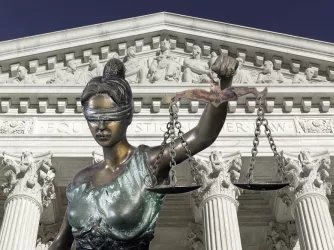
Supreme Court must halt unprecedented TikTok ban to allow review, FIRE argues in new brief to high court

Australia blocks social media for teens while UK mulls blasphemy ban
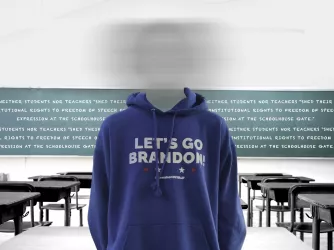
Free speech advocates converge to support FIRE’s ‘Let's Go Brandon’ federal court appeal


